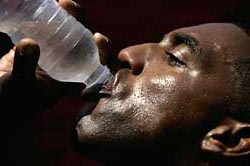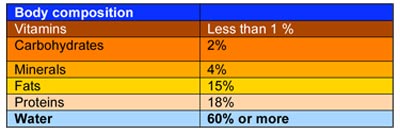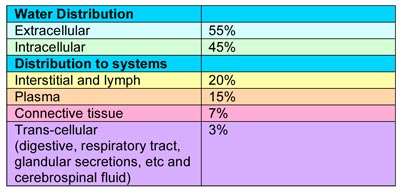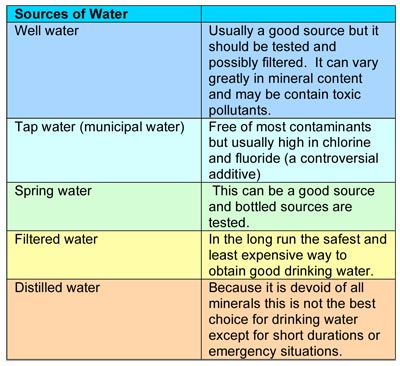Learn
![]()
Water is the most abundant and important substance on Earth as well as the human body. Water, fluids, and hydration are a critical part of nutrition that is essential to health.
Three simple elements, two hydrogen and one oxygen, are bound together forming the water molecule. All other nutrients can be found in this universal solvent. Most substances on Earth dissolve into it to varying degrees. Sixty to seventy percent of our body is water, the fundamental component of all bodily fluids. Blood, lymph, digestive juices, urine, tears, and sweat are all made up primarily of water. Practically all bodily functions, such as circulation, digestion, absorption, and elimination, depend on water. Water carries all-important electrolytes and mineral salts that convey electrical currents in the body. The macrominerals that make up the electrolytes are sodium, potassium, calcium, magnesium, and chloride.
Because water is such a good solvent it is the basis of all of our beverages. Water can also dissolve undesirable elements, such as toxic pollutants and pesticides. These can be difficult to remove and cause many complications with our ability to obtaining good quality drinking water.
![]()
 The amount of water we need every day is based on a number of factors. Our size, activity level, climate, and diet are all factors that determine our daily needs. It is very important to drink some pure water every day, however, all of the beverages we drink — teas, coffee, soda, sports drinks — contain mostly water. Some of these have components that can reduce hydration. Examples would be the caffeine in black tea or coffee and the sugar or artificial sweeteners in soda. It is recommended then to focus on pure water, herbal tea (cold or hot) and good quality sports drinks to fulfill your hydration needs.
The amount of water we need every day is based on a number of factors. Our size, activity level, climate, and diet are all factors that determine our daily needs. It is very important to drink some pure water every day, however, all of the beverages we drink — teas, coffee, soda, sports drinks — contain mostly water. Some of these have components that can reduce hydration. Examples would be the caffeine in black tea or coffee and the sugar or artificial sweeteners in soda. It is recommended then to focus on pure water, herbal tea (cold or hot) and good quality sports drinks to fulfill your hydration needs.
How much should I drink?
The average human intake level is about three quarts including food and water. About half of your water intake can be satisfied by food, if the food has high water content such as fruits, vegetables, legumes, and grains. Other foods such as meats do not contribute to water intake nearly as much. One rule of thumb put forth by many nutritional researchers is to drink approximately ½ your body weight in ounces daily. For example, a 150 lb person would drink about seventy-five ounces per day. This would be adjusted up or down slightly depending on the factors mentioned previously, climate, activity level, dietary habits, etc.
When should I drink water?
Drinking one or two glasses upon waking is a good practice. Water should also be taken in between meals, not closer than forty-five minutes after or thirty minutes before a meal. If water is taken too close to a meal it will dilute digestive juices, weakening the digestive process. Water and other beverages should be avoided or limited to very small amounts at mealtime. Additional water or hydration beverages should be taken before during and after physical activity.
In order to have perspective on how important water is we can look at the tables below:

Water is distributed throughout the body according to the following table:

The average daily water loss is approximately two quarts (sixty-four ounces). This figure does not account for exercise, excessive heat, or other factors.
![]()
Hundreds or thousands of years ago drinking water was obtained from springs, flowing rivers, or streams. Today there are many options for choosing our drinking water... and many complications. The explosion of the industrial age has left us with many problems with our water supply. We must be cautious about the source and content of the water we drink.

![]()
Dehydration is a very serious condition. Fifteen to twenty percent of lost body weight, as water is fatal. Dehydration of as little as a two percent loss of body weight can result in impaired physiological and performance responses. Symptoms of mild dehydration include headache and fatigue. A common cause of dehydration is illness, specifically if vomiting and/or diarrhea are involved. Also very hot dry conditions and overexertion are other common causes. A good strategy when feeling poorly is to try hydrating as a first response.
It is possible to drink too much water. In fact, people have died for this very reason. Over-hydration is disruptive to nerve cell function and can produce symptoms of lightheadedness or mild vertigo. Over-hydration causes an imbalance. Too much water and not enough electrolytes, especially sodium, is the result. This dilution of the body's fluids causes dysfunction of many functions that depend on electrical activity through the electrolytes. Because brain cells are susceptible to fluid imbalances, over-hydration and water intoxication can produce neurological symptoms such as altered personality, and disoriented behavior. Water intoxication can also result in convulsions, circulatory shock, coma, and death.
Immediate medical attention may be required when symptoms of over-hydration or dehydration occur. Avoiding complications requires fluid intake to be very carefully monitored by a healthcare professional.
![]()
Water is important throughout life. As we age however, water becomes even more critical. Dehydration is one of the major problems in adults and the elderly. The human body absorbs water less efficiently as age increases. In addition, the signals that tell your brain you are thirsty do not work as well in the elderly. In fact, in his book, "Your Body's Many Cries for Water" by F. Batmanghelidj, MD, points out that most of the time when we get a signal of hunger it is really a call for water. We have confused the signal seek out food when all our cells and tissues really want is water. So next time you feel hungry, try Dr. Batman's tip and drink a glass of water instead of eating and see if your hunger pangs disappear.
To sum it up, water intake at about ½ your body weight in ounces daily is very important. As you go through life cycle changes, water intake becomes increasingly important. While the amount required doesn't change, your body's ability to adjust to less water intake does.
![]()
There are many hydration products and sports drinks available today. Here are some guidelines to help you evaluate how healthy and helpful they might be.
Why do sports drinks hydrate better than water? There are three reasons.
- Fluids are absorbed through the gut and into the bloodstream faster when their osmolality closely matches that of body fluids such as blood. Osmolality is the concentration of dissolved particles in a fluid. Since sports drinks have dissolved minerals and carbs, the water does not reach the bloodstream as fast.
- Sports drinks allow for the optimal fluid balance
- The sodium content of sports drinks stimulates thirst so an athlete actually drinks more liquids than if they drink just water
Calories in sports drinks increase energy and endurance and promote faster recovery.